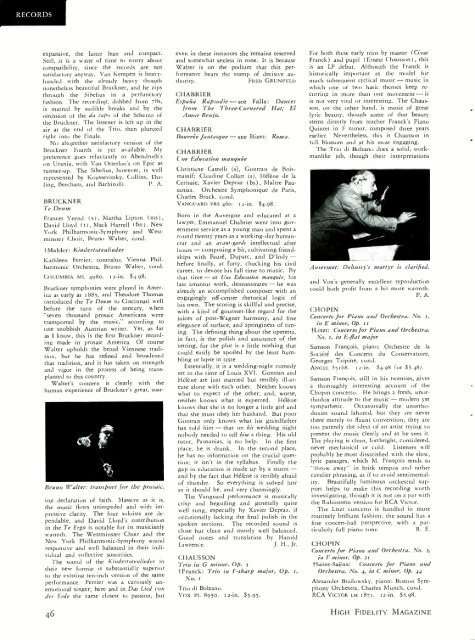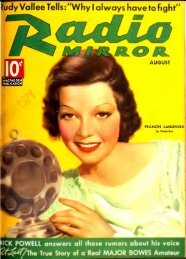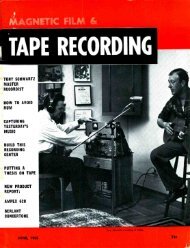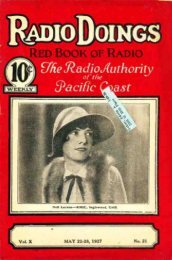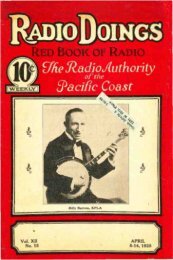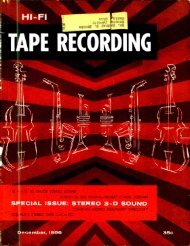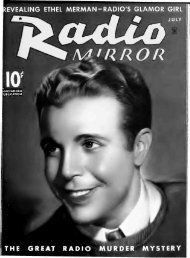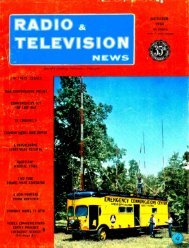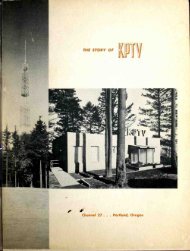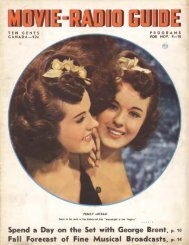Aug - AmericanRadioHistory.Com
Aug - AmericanRadioHistory.Com
Aug - AmericanRadioHistory.Com
You also want an ePaper? Increase the reach of your titles
YUMPU automatically turns print PDFs into web optimized ePapers that Google loves.
RECORDS<br />
expansive, the latter lean and compact.<br />
Still, it is a waste of time to worry about<br />
compatibility, since the records are not<br />
satisfactory anyway. Van Kempen is heavy -<br />
handed with the already heavy though<br />
nonetheless beautiful Bruckner, and he zips<br />
through the Sibelius in a perfunctory<br />
fashion. The recording, dubbed from 78s,<br />
is marred by audible breaks and by the<br />
omission of the da capo of the Scherzo of<br />
the Bruckner. The listener is left up in the<br />
air at the end of the Trio, then plunged<br />
right into the Finale.<br />
No altogether satisfactory version of the<br />
Bruckner Fourth is yet available. My<br />
preference goes reluctantly to Abendroth's<br />
on Urania, with Van Otter loo' s on Epic as<br />
runner -up. The Sibelius, however, is well<br />
represented by Koussevitzky. Collins, Ehrling,<br />
Beecham. and Barbirolli. P. A.<br />
BRUCKNER<br />
Te Deumm<br />
Frances Yeend ( s ) , Martha Lipton (ms) ,<br />
David Lloyd ( t ) , Mack Harrell (bn) . New<br />
York Philharmonic- Symphony and Westminster<br />
Choir, Bruno Walter, cond.<br />
- Mahler: Kindertotenlieder<br />
Kathleen Ferrier, contralto; Vienna Philharmonic<br />
Orchestra, Bruno Walter, cond.<br />
COLUMBIA ML 4980. 12 -in. $4.98.<br />
Bruckner symphonies were played in America<br />
as early as 1885, and Theodore Thomas<br />
introduced the Te Deum to Cincinnati well<br />
before the turn of the century, when<br />
"seven thousand prosaic Americans were<br />
transported by the music,' according to<br />
one snobbish Austrian writer. Yet, as far<br />
as I know, this is the first Bruckner recording<br />
made in prosaic America. Of course<br />
Walter upholds the broad Viennese tradition,<br />
but he has refined and broadened<br />
that tradition, and it has taken on strength<br />
and vigor in the process of being transplanted<br />
to this country.<br />
Walter's concern is clearly with the<br />
human experience of Bruckner's great, soar-<br />
Bruno Walter: transport for the prosaic.<br />
ing declaration of faith. Massive as it is,<br />
the music flows unimpeded and with impressive<br />
clarity. The four soloists are dependable,<br />
and David Lloyd's contribution<br />
in the Te Ergo is notable for its musicianly<br />
warmth. The Westminster Choir and the<br />
New York Philharmonic -Symphony sound<br />
responsive and well balanced in their individual<br />
and collective sonorities.<br />
The sound of the Kindertotenlieder in<br />
their new format is substantially superior<br />
to the existing ten -inch version of the same<br />
performance. Ferrier was a curiously unemotional<br />
singer; here and in Das Lied von<br />
der Erde she came closest to passion, but<br />
46<br />
even in these instances she remains reserved<br />
and somewhat sexless in tone. It is because<br />
Walter is on the podium that this performance<br />
bears the stamp of decisive authority.<br />
FRED GRUNFELD<br />
CHABRIER<br />
España Rapsodie - see Falla: Dances<br />
from The Three -Cornered Hat; El<br />
Autor Brujo.<br />
CHABRIER<br />
Bourrée fantasque- see Bizet:<br />
CHABRIER<br />
Une Education manquée<br />
Roma.<br />
Christiane Castelli (s), Gontran de Bois -<br />
massif; Claudine Collart (s), Hélène de la<br />
Cerisaie; Xavier Depraz (bs), Maitre Pausanias.<br />
Orchestre Symphonique de Paris,<br />
Charles Bruck, cond.<br />
VANGUARD vas 460. 12 -in. $4.98.<br />
Born in the Auvergne and educated as a<br />
lawyer, Emmanuel Chabrier went into government<br />
service as a young man and spent a<br />
round twenty years as a working -day bureaucrat<br />
and an ayant -garde intellectual after<br />
hours - composing a bit, cultivating friendships<br />
with Fauré, Duparc, and D'Indy -<br />
before finally, at forty, chucking his civil<br />
career, to devote his full time to music. By<br />
that time - as Une Education manquée, his<br />
last amateur work, demonstrates - he was<br />
already an accomplished composer with an<br />
engagingly off -center rhetorical logic of<br />
his own. The scoring is skillful and precise,<br />
with a kind of gourmet -like regard for the<br />
juices of post -Wagner harmony, and fine<br />
elegance of surface, and springiness of timing.<br />
The defining thing about the operetta,<br />
in fact, is the polish and assurance of the<br />
setting, for the plot is a little nothing that<br />
could easily be spoiled by the least bumbling<br />
or lapse in taste.<br />
Essentially, it is a wedding -night comedy<br />
set in the time of Louis XVI. Gontran and<br />
Hélène are just married but terribly ill -atease<br />
alone with each other. Neither knows<br />
what to expect of the other; and, worse,<br />
neither knows what is expected. Hélène<br />
knows that she is no longer a little girl and<br />
that she must obey her husband. But poor<br />
Gontran only knows what his grandfather<br />
has told him - that on his wedding night<br />
nobody needed to tell him a thing. His old<br />
tutor, Pausanias, is no help. In the first<br />
place, he is drunk. In the second place,<br />
he has no information on the crucial question;<br />
it isn't in the syllabus. Finally the<br />
gap in education is made up by a storm -<br />
and by the fact that Hélène is terribly afraid<br />
of thunder. So everything is solved just<br />
as it should be, and very charmingly.<br />
The Vanguard performance is musically<br />
crisp and beguiling and generally quite<br />
well sung, especially by Xavier Depraz, if<br />
occasionally lacking the final polish in the<br />
spoken sections. The recorded sound is<br />
close but clean and mostly well balanced.<br />
Good notes and translation by Harold<br />
Lawrence.<br />
J. H., Jr.<br />
CHAUSSON<br />
Trio in G minor, O. ;<br />
1-Franck: Trio in F -sharp major, Op. r,<br />
No. r<br />
Trio di Bolzano.<br />
VOX PL 895o. 12 -in. $5.95.<br />
For both these early trios by master (César<br />
Franck) and pupil (Ernest Chausson) , this<br />
is an LP debut. Although the Franck is<br />
historically important as the model for<br />
much subsequent cyclical music - music in<br />
which one or two basic themes keep recurring<br />
in more than one movement - it<br />
is not very vital or interesting. The Chausson,<br />
on the other hand, is music of great<br />
lyric beauty, though some of that beauty<br />
stems directly from teacher Franck's Piano<br />
Quintet in F minor, composed three years<br />
earlier. Nevertheless, this is Chausson in<br />
full blossom and at his most engaging.<br />
The Trio di Bolzano does a solid, workmanlike<br />
job, though their interpretations<br />
Artsermel: Debussy's martyr is clarified.<br />
and Vox's generally excellent reproduction<br />
could both profit from a bit more warmth.<br />
P. A.<br />
CHOPIN<br />
Concerto for Piano and Orchestra, No. I.<br />
in E minor, Op. r r<br />
Liszt: Concerto for Piano and Orchestra,<br />
No. r, in E flat major<br />
Samson François, piano; Orchestre de la<br />
Société des Concerts du Conservatoire,<br />
Georges Tzipine, cond.<br />
ANGEL 35168. 12 -in. $4.98 (or $3.48).<br />
Samson François, still in his twenties, gives<br />
a thoroughly interesting account of the<br />
Chopin concerto. He brings a fresh, unorthodox<br />
attitude to the music - modern yet<br />
sympathetic. Occasionally the unorthodoxies<br />
sound labored, but they are never<br />
there merely to flaunt convention; they are<br />
too patently the ideas of an artist trying to<br />
present the music clearly and as he sees it.<br />
The playing is clean, forthright, considered,<br />
never mechanical or cold. Listeners will<br />
probably be most dissatisfied with the slow,<br />
lyric passages, which M. François tends to<br />
"throw away" in brisk tempos and rather<br />
cavalier phrasing, as if to avoid sentimental.<br />
ity. Beautifully luminous orchestral support<br />
helps to make this recording worth<br />
investigating, though it is not on a par with<br />
the Rubinstein version for RCA Victor.<br />
The Liszt concerto is handled in more<br />
routinely brilliant fashion; the sound has a<br />
fine concert -hall perspective, with a particularly<br />
full piano tone. R. E.<br />
CHOPIN<br />
Concerto for Piano and Orchestra, No. 2,<br />
in F minor, Op. 21<br />
1Saint-Saëns: Concerto for Piano and<br />
Orchestra, No. 4, in C minor, Op. 44<br />
Alexander Brailowsky, piano; Boston Symphony<br />
Orchestra, Charles Munch, cond.<br />
RCA VICTOR LM 1871. 12-in. $3.98.<br />
HIGH FIDELITY MAGAZINE


